This article is all about Pea Protein & FODMAPs. Is pea protein low FODMAP? Have products containing pea protein gone through lab testing to assess FODMAP content? How can you tell from reading a label that contains pea protein whether it is low FODMAP or not? Are there Monash certified products containing pea protein, and are there FODMAP Friendly products containing pea protein?
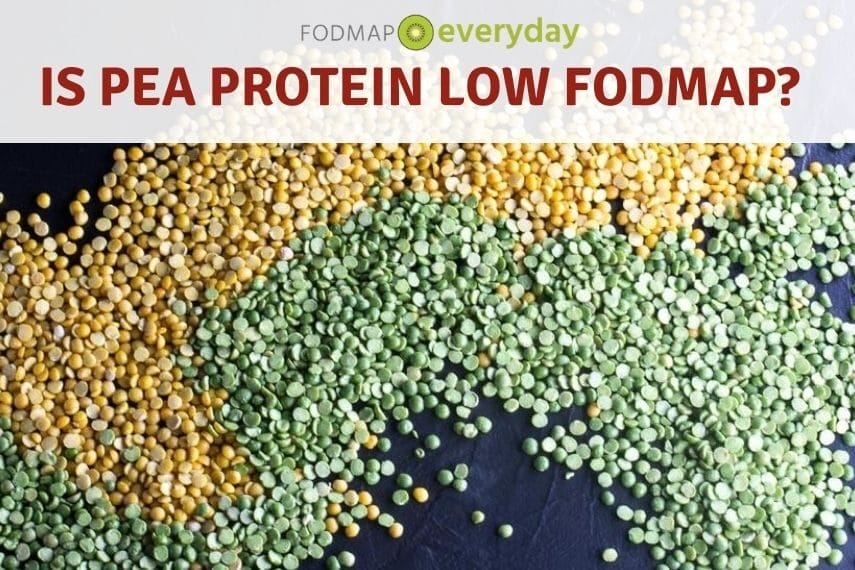
Here are all your questions answered.
Protein & FODMAPs
FODMAPs are carbohydrates and when we have pure protein sources, such as beef, chicken or seafood, or pure fats, like olive oil or coconut oil, we don’t have to worry about FODMAP content. But some proteins come under scrutiny, especially when they are processed.
What Is A Processed Protein?
Well, even tofu is considered processed. “Processed” is not a bad word. It is just a process! How do soybeans become tofu? Through a process – and depending on what that process is we can end up with a low FODMAP product or not. Just like some tofu is low FODMAP and some is high. (More on tofu in Soy Products – Low FODMAP or Not?).
Pea Protein As a Powder & Ingredient
What we want to talk about here is pea protein powder in particular. There is a lot of conversation and confusion around pea protein powders. Are they low FODMAP? Or are they high FODMAP? How does one assess the FODMAP content as a consumer? And what products that contain pea protein can we have, even during Elimination?
How Pea Protein Is Made
Pea protein is made from dried yellow peas and split green peas. The first step in pea protein production is to clean and remove all potential allergens including gluten. Next, the fibrous hull is removed, and the pea is split into starch, protein, or pea flour.
We are going to look at two kinds of pea protein: pea protein concentrate and pea protein isolate. When you see just the words “pea protein” on a label, it is likely pea protein concentrate.
Pea Protein Concentrate
Pea protein concentrate is made by milling pea protein into fine particles through a dry-milling process.
Pea Protein Isolate
Pea protein isolate is made in a wet process where pea protein is added to alkaline water and ultra-filtered (precipitated) through iso-electric charges (a chemical reaction).
Pea protein isolate yields higher protein content and less carbohydrates than pea protein concentrate and likely contains fewer FODMAPs based on the different processing methods.
How Much Protein Is In Pea Protein?
The amount of protein in pea protein and pea protein isolate powders can range from 48% to 90%, so not all are created equal in terms of protein percentages.
If you are looking at a product that contains a pea protein as part of a larger ingredient list, simply refer to the nutrition panel to understand the total protein in the serving size of that item.
If you are assessing a pure protein powder, again, refer to the nutrition panel and take note that one brand and formulation might have a very different amount of protein per serving than another.
Quality of Protein
Pea protein contains all the essential amino acids but is low in methionine. Pea proteins from different sources can vary in percentage and quality depending on the brand, how the protein was processed, and whether it is a concentrate or isolate. Isolates typically have more protein.
Even when supplying equal amounts of protein, the amount of fiber can vary. Some are a good source of fiber, while others contain very little.
Pea protein is relatively low in fat.
Facts About Pea Protein & FODMAPs
Some of the following information was confirmed via private correspondence with OWYN, product manufacturers and Monash University during August 2020.
Here are facts and details:
- OWYN plant-based protein drinks are based on their “OWYN Protein Blend” that includes pea protein (as well as organic pumpkin protein and organic flax oil).
- OWYN drinks were lab tested and certified as low FODMAP by Monash University and OWYN participated in the Monash low FODMAP certification program for a period of time.
- During this time the OWYN beverages were listed on the Monash app and on the Monash website.
- Also, during this time, “pea protein” was listed on the Monash app as its own line item as having a low FODMAP serving size.
- OWYN decided to end their license agreement with Monash, in regard to their certification program.
- Monash removed mention of OWYN drinks from their app and website.
- Monash removed “pea protein” as a line item from their app.
- OWYN has confirmed that their pea protein blend has not changed and that their product formulations have not changed.
- There are products that contain pea protein and/or pea protein isolate that are lab tested and certified low FODMAP by FODMAP Friendly. (Please see list below of several products).
- Monash has recently (2020) added VITESSENCE® Pulse 1803, which is pea protein isolate, to their smartphone app as a lab tested certified low FODMAP product with a serving size of 75 g.
Lab Tested Low FODMAP Certified Products Containing Pea Protein
As of May 2021, there is one commercially produced product listed on the Monash app that contains pea protein, which is Hum Core Strength Protein Powder.
There is also a product that is Monash certified that is aimed at manufacturers – VITESSENCE® Pulse 1803. This is a pea protein isolate made by Ingredion and it has a very generous low FODMAP serving size of 75 g.
All of the following products have been lab tested and certified as low FODMAP by FODMAP Friendly and contain pea protein or pea protein isolate. We have not listed full ingredient lists; we are just listing what type of pea protein is used in the product, as listed by manufacturer.
More will be listed as they come to market.
- Casa de Santé Vegan Protein in Vanilla – Pea protein isolate
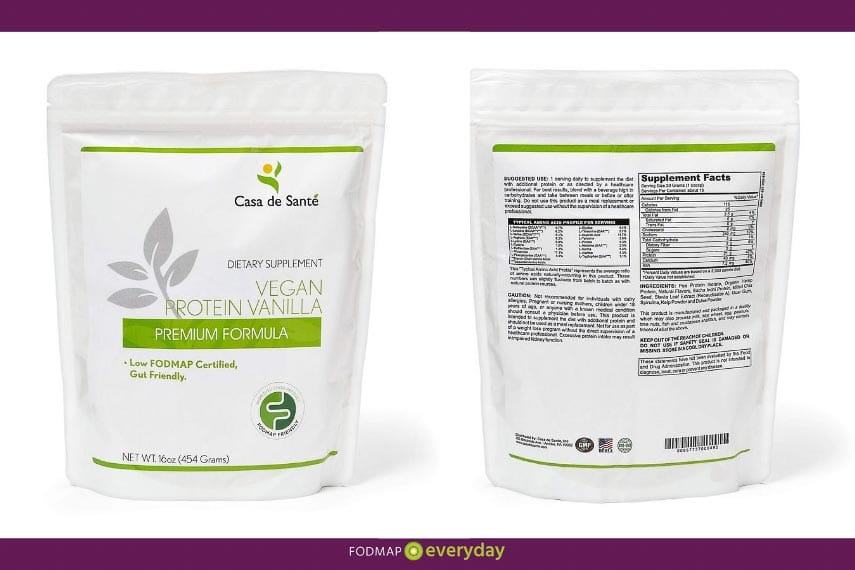
FODBODS
- FodBods Mint Chocolate Bars – Organic Protein Blend (Pea and Rice).
- FodBods Raspberry Coconut Mini Protein Bars – Organic Protein Blend (Pea and Rice).
- FodBods Peanut & Choc Chunk Bars – Organic Protein Blend (Pea and Rice).
- FodBods Lemon & Coconut Bars – Organic Protein Blend (Pea and Rice).
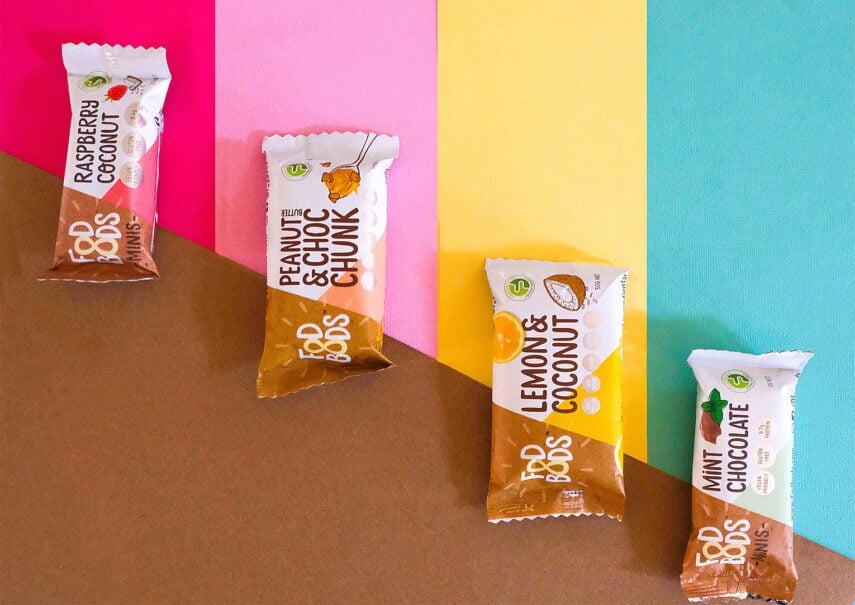
GoMacro
- GoMacro Mocha Chocolate Chip (my favorite) – Organic Protein Blend (Organic Sprouted Brown Rice Protein, Organic Pea Protein).
- GoMacro Dark Chocolate + Almonds – Organic Protein Blend (Organic Sprouted Brown Rice Protein, Organic Pea Protein).
- GoMacro Coconut + Almond Butter + Chocolate Chips – Organic Protein Blend (Organic Sprouted Brown Rice Protein, Organic Pea Protein).
- GoMacro Granola + Coconut – Organic Protein Blend (Organic Sprouted Brown Rice Protein, Organic Pea Protein).
- GoMacro Banana + Almond Butter – Organic Protein Blend (Organic Sprouted Brown Rice Protein, Organic Pea Protein).
- GoMacro Oatmeal Chocolate Chip Cookie Kids Bar – Organic Protein Blend (Organic Sprouted Brown Rice Protein, Organic Pea Protein).
- GoMacro Double Chocolate Brownie Kids Bar – Organic Protein Blend (Organic Sprouted Brown Rice Protein, Organic Pea Protein).
- GoMacro Chocolate Chip Cookie Dough Kids Bar – Organic Protein Blend (Organic Sprouted Brown Rice Protein, Organic Pea Protein).
- GoMacro Double Chocolate + Peanut Butter Chips Mini – Organic Protein Blend (Organic Sprouted Brown Rice Protein, Organic Pea Protein).
- GoMacro Oatmeal Chocolate Chip Mini – Organic Protein Blend (Organic Sprouted Brown Rice Protein, Organic Pea Protein).
- GoMacro Maple Sea Salt Mini – Organic Protein Blend (Organic Sprouted Brown Rice Protein, Organic Pea Protein).
- GoMacro Peanut Butter Chocolate Chip Mini – Organic Protein Blend (Organic Sprouted Brown Rice Protein, Organic Pea Protein).
- GoMacro Coconut + Almond Butter + Chocolate Chips Mini – Organic Protein Blend (Organic Sprouted Brown Rice Protein, Organic Pea Protein).
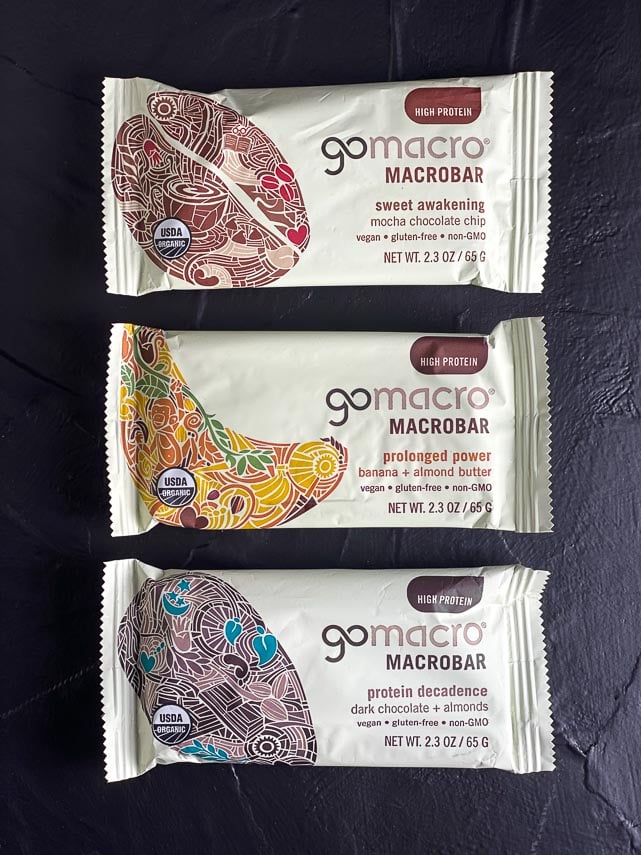
Hum
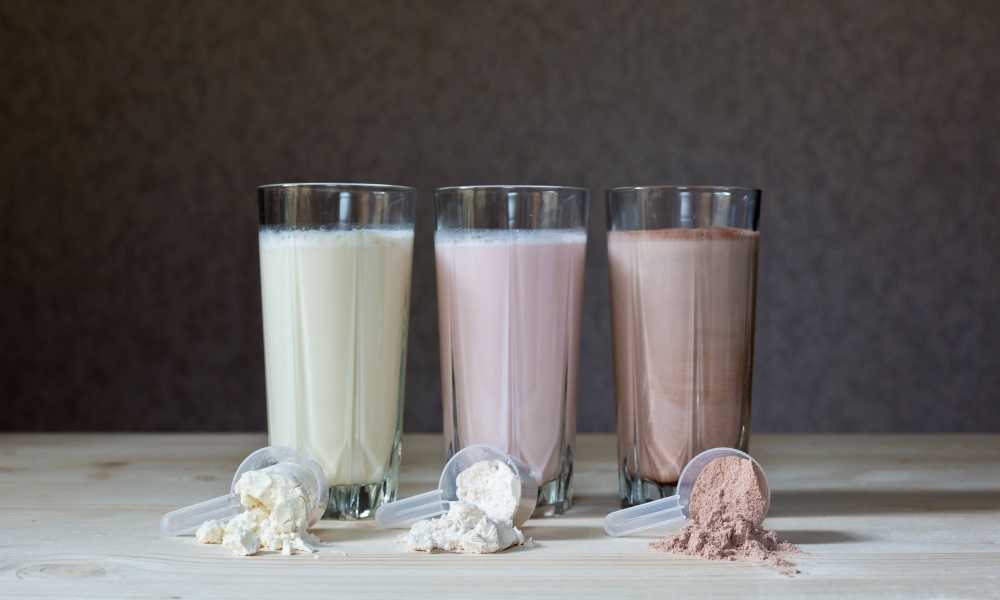
You may want to read:
All About Meal Replacements & Protein Shakes
OWYN Pea Protein-Based Beverages
These products were lab tested by Monash University but are no longer part of the certification program. Their formulas and ingredients have NOT changed since they were lab tested and certified as low FODMAP. We have not listed full ingredient lists; we are just listing what type of pea protein is used in the product, as listed by manufacturer.
Owyn
- OWYN Cold Brew Coffee Protein Drink – OWYN™ Protein Blend (Pea Protein, Organic Pumpkin Seed Protein, Organic Flax Oil).
- OWYN Cookies n’ Cream Protein Drink – OWYN™ Protein Blend (Pea Protein, Organic Pumpkin Seed Protein, Organic Flax Oil).
- OWYN Dark Chocolate Protein Drink – OWYN™ Protein Blend (Pea Protein, Organic Pumpkin Seed Protein, Organic Flax Oil).
- OWYN Turmeric Golden Mylk Protein Drink – OWYN™ Protein Blend (Pea Protein, Organic Pumpkin Seed Protein, Organic Flax Oil).
- OWYN Vanilla Protein Drink – OWYN™ Protein Blend (Pea Protein, Organic Pumpkin Seed Protein, Organic Flax Oil).
- OWYN Strawberry Banana Protein Drink – OWYN™ Protein Blend (Pea Protein, Organic Pumpkin Seed Protein, Organic Flax Oil).
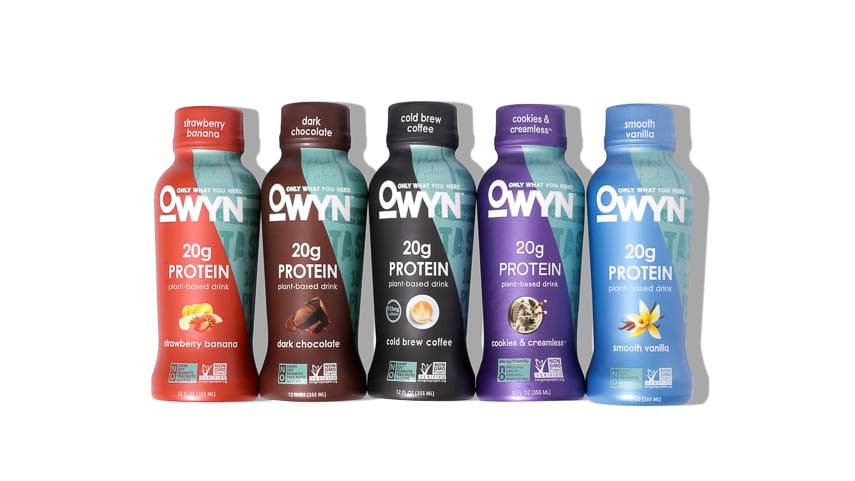
Pea Fiber
Is pea fiber low FODMAP?
Yes, there have been two kinds of pea fiber lab tested by Monash and certified as low FODMAP by Monash University.
Nutriose® Pea 10 is a plant-based soluble pea fiber made by Roquette and is low FODMAP in serving sizes of 10 g.
Nutriose® Pea 06 is a sugar-free plant-based soluble pea fiber made by Roquette and is low FODMAP in serving sizes of 10 g
We wanted to address pea fiber in this article since many of you are curious about whether it is low FODMAP and if you are reading about pea protein, you might be searching for pea fiber info, too.
Similar to the VITESSENCE® Pulse 1803 mentioned above, you might not see “Nutriose® Pea 10″ or “Nutriose® Pea 06″ on an ingredient list. These are pea fibers aimed at manufacturers to use within products.
The Takeaway
Pea protein and pea protein isolate are used in products that have been lab tested by both Monash University and FODMAP Friendly and have been certified as low FODMAP and suitable for Elimination. When you see these icons below on a product, you know the product has gone through one of the certification programs.
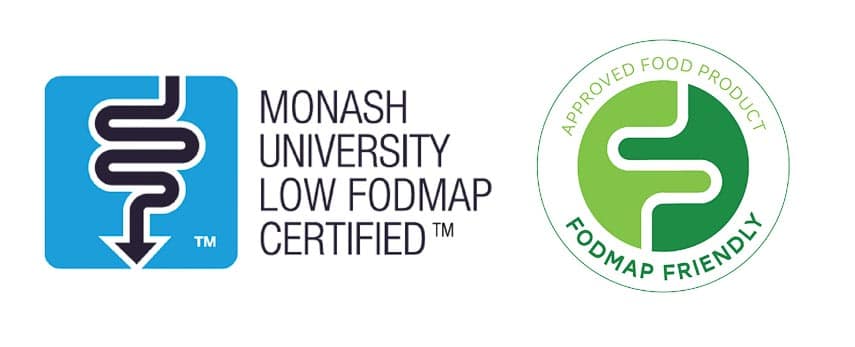
Some Amount Of Pea Protein & Pea Protein Isolate Is Low FODMAP
What we can learn from the products that have been lab tested is that we know that some amount of pea protein and pea protein isolate are low FODMAP in general.
Pea Protein Isolate Made By Ingredion
In the specific instance of a pea protein isolate made by Ingredion, called VITESSENCE® Pulse 1803, we know that 75 g of this product is low FODMAP as tested and certified by Monash, which is a generous amount.
NOTE: This is a product aimed at manufacturers. As a consumer you will most likely not see the words “VITESSENCE® Pulse 1803” on a label. If you do, then you will know for sure. Most likely it will just be labeled as “pea protein isolate” and you will not necessarily know if it is this exact product.
One can hope that since it is a lab tested and certified low FODMAP product that manufacturers will take advantage of that. Time will tell.
Should You Try Pea Protein?
The final takeaway is that if a product contains pea protein or pea protein isolate and has been lab tested and certified as low FODMAP, then it is low FODMAP in the serving sizes suggested.
If you are looking into a product that contains pea protein or pea protein isolate that has not been lab tested and certified, then be prudent with your approach and the articles below will help you make decisions.
Our suggestion:
We know that some amount of pea protein and pea protein isolate are low FODMAP.
If you are in your Challenge Phase (or beyond) and are stable, then products containing these proteins are worth trying.
Individual results will vary; always eat to YOUR tolerance.
For complementary information please read the following articles:
- How To Read A Low FODMAP Certified Low FODMAP Product Label
- How To Read A FDA Nutrition Facts Label
- What Is A Low FODMAP Serving Size?
- Meet FODMAP Friendly: Certification & Education
- Monash University & The Low FODMAP Diet
- All About Meal Replacements & Protein Shakes (updated 8/2020)
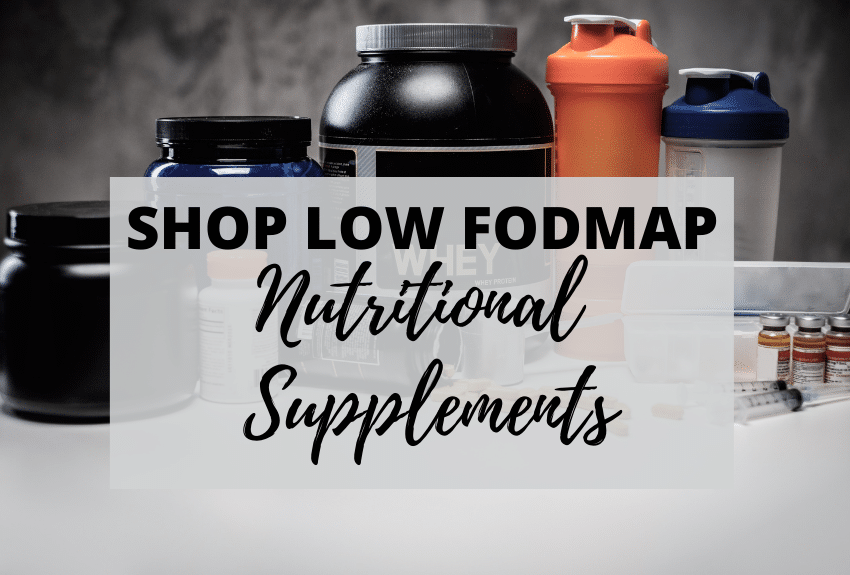

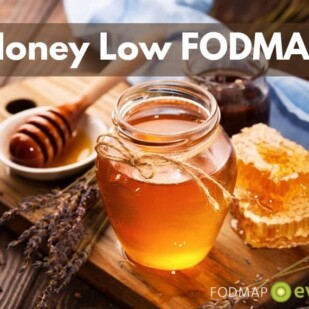






What does “suitable for elimination” mean. Elimination from what?
The entire low FODMAP diet is predicated on a structured Elimination phase (and then a Challenge and Integration Phase), referred to as “Elimination. You can read out it HERE and HERE.
Thanks for this in-depth analysis. I’ve never used any pea protein/isolate but would like to make some protein bars using 1/4 cup for the whole recipe but haven’t the slightest idea which one I would like the flavor of. How do you pick one without knowing how it tastes? Thank you for your help.
I think you just have to dive in. Purchase one, make your recipe – which I assume will have “flavors” such as chocolate or maple or incorporate raisins or spices and see how it goes. I have not played around with any in baking/cooking/recipe development yet. Then assess. You can then tweak for texture and flavor on the second go-round, or maybe you’ll nail it!
Thanks for your reply; about to dive in, lol!